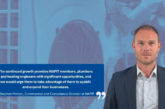
Fergus, the software that helps reduce the burden of business admin on tradespeople, has launched a five point plan for tradespeople to get their business into shape for 2023.
“As we head towards the end of the year, we would encourage trade business owners to view the end of the year as more than just a series of administrative tasks and more of a chance to get ‘financially fit’ and ready to go again in 2023,” says James Chillman, UK Country Manager for Fergus. “We have put together these five key habits to adopt to get your business ready for the new year and in good shape to meet the challenges it could face.”
Financial habit 1: Record-keeping
It’s all about discipline when it comes to keeping on top of the books. Take a different approach to book-keeping and make it less onerous by setting aside a small amount of time every day (or at least every other day). If you can’t do it, seriously consider hiring or outsourcing it to someone who can.
Financial habit 2: Understand how your business is performing
Look back through your books for common traits of bad debtors. For some businesses this can be a game-changer. Know your numbers, look at the areas of your business that impact most on your profit and take note of where your business is performing well and where it is not. At a more granular level, look for patterns in jobs that generated good profit returns and use what you learn to decide what future work you take on.
Financial habit 3: Regularly review debts and assets
Write off debts that you can’t recover and rid yourself of obsolete stock and assets that are no longer revenue-generating. This can be painful, but it can also be liberating, allowing you to focus on your profitable clients.
Financial habit 4: Put tax owed aside
Make sure you have enough reserves to pay your taxes, whether you are VAT registered or not. Consider setting up a separate account and transferring smaller amounts as you go, which will only be earmarked for tax payments.
Financial habit 5: Get the right systems in place to support every day invoicing
A business makes no money until the invoice is sent, and the cash collection cycle can happen. If you are invoicing and following up on invoices every day you will notice the cash starts to come in very quickly.













